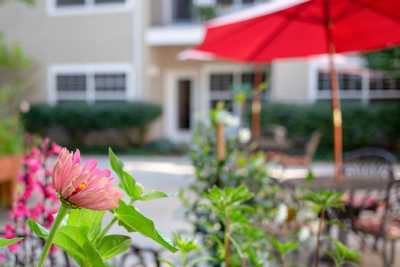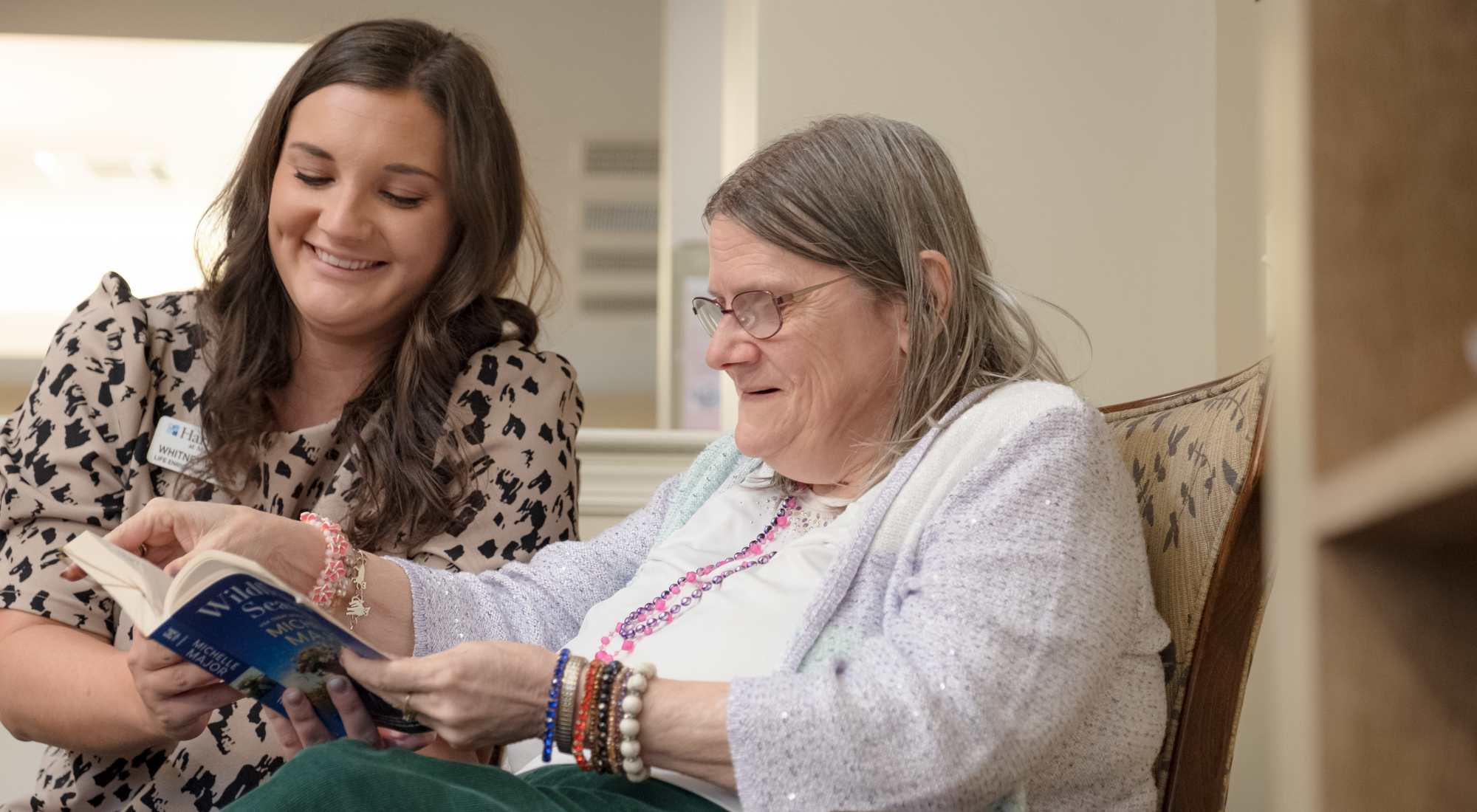Boutique Memory Care That Feels Like a Custom Sanctuary
Boutique Memory Care That Feels Like a Custom Sanctuary
Blog Article
All About Memory Treatment Solutions: Why Little Memory Care Homes Are a Fantastic Choice
Memory care solutions play a crucial duty in sustaining individuals with Alzheimer's and dementia. Tiny memory treatment homes stick out for their customized method and intimate setting. With reduced staff-to-resident proportions, these homes promote stronger links and tailored care. Homeowners profit from enhanced social communications and a secure atmosphere. As families discover alternatives, understanding the one-of-a-kind benefits of little memory care homes ends up being essential. What aspects should be thought about when selecting the ideal home?
Recognizing Memory Care Services
While many might recognize with basic elderly treatment choices, understanding memory care solutions is crucial for family members facing the difficulties of cognitive decrease. Memory care especially deals with individuals with problems such as Alzheimer's disease and various other forms of dementia. These solutions supply a structured setting that concentrates on boosting the lifestyle for locals via specialized treatment and support.Memory treatment facilities are developed to assure safety and protection, often including safeguarded environments to stop wandering. Trained team member are available all the time to aid with daily tasks, drug management, and personal treatment. In addition, memory treatment programs often include cognitive stimulation tasks, customized to engage locals and advertise psychological well-being. Households can profit from recognizing these services, as they allow educated choices regarding their enjoyed ones' treatment, making sure that their particular requirements and choices are addressed in a caring and encouraging way.
The Benefits of Small Memory Treatment Homes
Small memory treatment homes supply distinct advantages that can considerably boost the lifestyle for locals with cognitive disabilities. One significant advantage is the intimate atmosphere, which allows for tailored interactions amongst personnel and homeowners. This smaller setting promotes meaningful relationships, lowering feelings of seclusion and stress and anxiety typically experienced by individuals with memory issues.Additionally, the reduced staff-to-resident ratio in small memory care homes makes it possible for caretakers to offer even more mindful supervision and support. This technique not only boosts safety yet also advertises a sense of safety for the residents.Moreover, small memory care homes can adapt promptly to the one-of-a-kind requirements and choices of each citizen, permitting a more homelike ambience. Such a setting can motivate social interaction and participation in activities, eventually enhancing the day-to-day experiences of those living with cognitive disabilities.
Personalized Treatment Program for Homeowners
Personalized treatment plans are important in memory treatment homes, as they satisfy the one-of-a-kind needs and preferences of each citizen. These strategies start with comprehensive evaluations performed by skilled specialists, who evaluate cognitive abilities, case history, and individual passions. This customized approach assurances that care is not just reliable but additionally considerate of each individual's self-respect and autonomy.Moreover, individualized treatment plans are versatile, allowing modifications as homeowners' requirements advance over time. This flexibility promotes a complacency and familiarity, which is essential for individuals living with memory difficulties. Caretakers are educated to execute these plans regularly, offering assistance that aligns with the homeowners' regimens and preferences.Ultimately, individualized care strategies enhance the top quality of life for homeowners by promoting independence, wellness, and involvement, making them an essential aspect of memory care services in little memory care homes.
Creating a Home-Like Setting
Creating a home-like setting is essential for cultivating convenience and experience in memory treatment settings, as it substantially affects locals' emotional well-being. Small memory care homes usually focus on tailored touches, such as warm color palettes, family images, and familiar furniture plans, which assist residents feel extra at simplicity. Including aspects reminiscent of a typical home, like cozy home and public locations, encourages a sense of belonging.Moreover, utilizing natural light and outside rooms can boost the environment, advertising relaxation and tranquility. Team member play a considerable role in keeping this atmosphere by engaging with citizens in a caring way, treating them like family members. Regular activities, such as food preparation or horticulture, can additionally add to a home-like feel, offering chances for citizens to participate in meaningful experiences. On the whole, producing a nurturing environment supports cognitive function and psychological stability, making it an essential element of memory care services.
Enhanced Social Interaction and Community
Enhanced social communication and community are necessary parts of memory treatment services. By promoting personalized social engagement and developing a family-like ambience, these solutions advertise significant links amongst residents. Group activities and occasions even more motivate participation, aiding people feel extra included and supported.
Customized Social Engagement
While social communication is crucial for overall well-being, several individuals with memory disabilities often battle to involve meaningfully with others. Personalized social site link engagement in memory care homes addresses this obstacle by creating tailored activities that satisfy locals' unique interests and capacities. By concentrating on specific choices, caregivers can cultivate links that resonate deeply with each individual. Activities why not check here such as art treatment, music sessions, and guided conversations promote cognitive excitement and emotional expression. In addition, little team settings motivate sociability and permit even more intimate communications, enhancing sensations of belonging. This strategy not just deals with feelings of seclusion however additionally encourages citizens to preserve a sense of identification, eventually adding to boosted mental health and wellness and lifestyle.
Family-like Environment
In a memory treatment setup, promoting a family-like ambience substantially boosts social communication and builds a feeling of area amongst locals. Smaller memory treatment homes usually focus on intimate atmospheres, enabling residents to develop closer connections with each other and team participants. This nurturing environment promotes trust, which is important for individuals with memory disabilities. Locals are extra likely to talk and share experiences, producing a supportive network that minimizes sensations of solitude. The knowledge of common rooms and routines adds to a sense of belonging, even more encouraging social communication (personalized memory care). In such setups, emotional bonds prosper, causing enhanced total well-being and a better of life for homeowners as they browse their everyday experiences with each other
Group Activities and Events

Safety and Safety Features in Small Houses
Lots of little homes made for memory care include important safety and security and protection functions to assure the wellness of residents. These homes often make use of safe access and departure factors to avoid roaming, a typical worry among people with memory disabilities. Furthermore, monitoring systems and alarm system mechanisms improve monitoring, making certain that staff can immediately react to any kind of unusual activities.Interior designs are customized for safety, with decreased threats such as sharp edges and clutter-free pathways. Handrails and non-slip flooring are usually set up to lower the danger of drops. Team member are educated in emergency methods, guaranteeing they are gotten ready for different situations.Moreover, individualized care plans may include evaluation of individual security needs, offering customized services for each and every local. Generally, these safety and protection attributes create a nurturing look at this site setting where residents can flourish while maintaining their dignity and independence.
How to Choose the Right Memory Treatment Home
Just how can families guarantee they select the most appropriate memory treatment home for their loved ones? The choice calls for careful factor to consider of a number of elements. Initially, households should assess the facility's staff certifications and training, ensuring that caretakers are experienced in handling memory-related problems. Next off, it's crucial to evaluate the home's atmosphere, concentrating on security attributes and whether it fosters a feeling of neighborhood and belonging. Going to the center can offer understanding into daily activities and the social environment, which are necessary for psychological excitement and emotional wellness. Additionally, family members need to inquire about the care strategies used, ensuring they are tailored to individual requirements. Taking into consideration the home's place and accessibility for family members brows through can add to a smoother change. By resolving these aspects, family members can make an informed decision that prioritizes their enjoyed one's convenience and lifestyle in a memory care setting.
Frequently Asked Questions
What Credentials Should Personnel Members in Memory Care Residences Have?
Personnel in memory care homes should possess pertinent qualifications, experience in dementia care, solid interaction skills, and concern. Ongoing training in behavioral administration and healing treatments boosts their capability to sustain homeowners successfully.
Exactly How Do Memory Care Services Differ From Conventional Assisted Living?
Memory care solutions focus particularly on people with memory problems, giving specialized assistance and structured atmospheres. On the other hand, standard assisted living uses general assistance with daily activities, lacking the customized approach necessary for those with cognitive difficulties.
What Types of Activities Are Provided in Memory Treatment Houses?
Memory care homes usually offer a range of activities developed to engage homeowners. Typical options include art therapy, songs sessions, cognitive video games, exercises, gardening, and social events, all intended at boosting well-being and cognitive function.
Can Locals Bring Their Own Possessions to Memory Treatment Residences?
Citizens can usually bring their very own valuables to memory care homes, enabling them to personalize their space - personalized memory care. This technique aids develop a familiar atmosphere, promoting convenience and a sense of identification for the people

Exactly How Are Relative Associated With the Care Refine?
Member of the family play an important function in the treatment process, often joining decision-making, going to treatment conferences, and supplying emotional assistance. Their involvement fosters a collaborative setting, boosting the homeowner's general well-being and lifestyle. While numerous might be acquainted with basic elderly care alternatives, understanding memory care services is essential for families encountering the obstacles of cognitive decline. These solutions offer a structured atmosphere that focuses on boosting the high quality of life for residents through specialized care and support.Memory treatment facilities are developed to assure safety and security and safety and security, usually featuring secured settings to stop roaming. Customized care strategies are crucial in memory treatment homes, as they cater to the unique requirements and preferences of each local. Team participants in memory care homes ought to possess appropriate certifications, experience in dementia treatment, strong communication skills, and concern. Memory care services concentrate particularly on individuals with memory problems, supplying specific support and organized environments.
Report this page